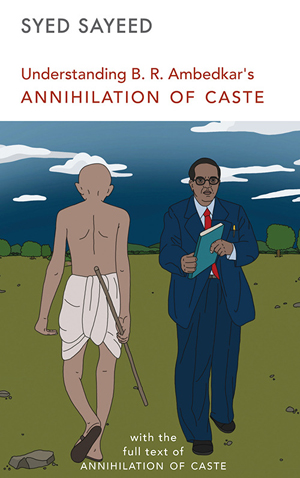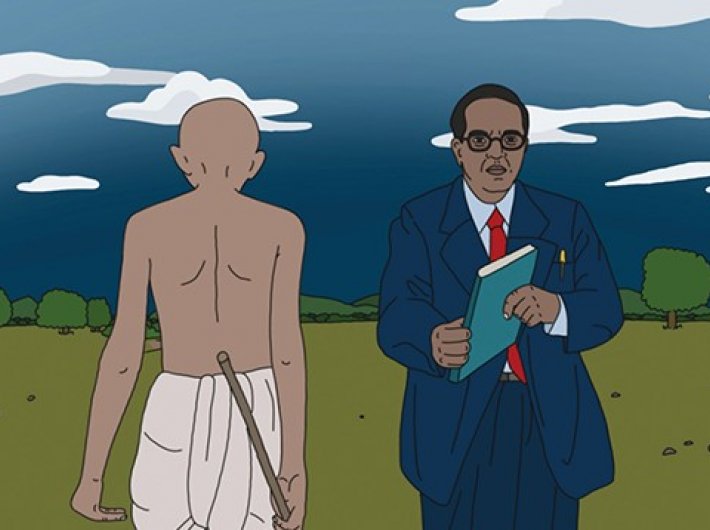In this excerpt from his just-released work, Sayed Sayeed argues for new ways to engage with that classic text
UNDERSTANDING B.R. AMBEDKAR’S “ANNIHILATION OF CASTE”
By Sayed Sayeed
Permanent Black, 252 pages, Rs 595.00
A just-released work on Dr. B.R. Ambedkar's well-known text, 'Annihilation of Caste', has been making waves. Written by Sayed Sayeed, a retired professor of philosophy, 'Understanding B.R. Ambedkar’s “Annihilation of Caste”', offers a fresh and contemporary understanding of the great visionary leader's most crucial work on the subject of caste. Prof. Sayeed argues that readings of 'Annihilation of Caste' have often obscured or twisted its core. Biographical interpretations deploying Ambedkar’s identity, and historical expositions drawing on circumstances in Ambedkar’s time, have distorted the spirit and import of his unambiguous condemnation of caste.
 By reflecting on a single seminal piece and offering an alternative view of it, this book shows the far-reaching implications and continuing relevance of Ambedkar’s thought – including for a proper perspective on Hindu nationalism. It shows the directions away from Ambedkar that caste politics and identity patrons have increasingly taken.
By reflecting on a single seminal piece and offering an alternative view of it, this book shows the far-reaching implications and continuing relevance of Ambedkar’s thought – including for a proper perspective on Hindu nationalism. It shows the directions away from Ambedkar that caste politics and identity patrons have increasingly taken.
As against Mahatma Gandhi who advocated caste reform, Ambedkar believed genuine democracy was impossible without the eradication of caste. In clarifying their different approaches to aspects of Hinduism, this book helps us focus on the Indian future that Ambedkar himself desired.
On the occasion of Ambedkar Jayanti, here is an excerpt in which the author introduces his approach to the celebrated text.
EXCERPT
'Annihilation of Caste' is probably Dr Ambedkar’s most considered statement on the caste issue and its implications for Hindu society and India. It is very probably also the most thoughtful and most acutely argued text by anyone on the question of caste, and therefore deserves to be studied very carefully. The various points Ambedkar makes in this essay need to be discussed ever more seriously because almost all the concerns he addresses in it remain largely unresolved; in fact some of the points he makes are even more relevant now than they were at the time it was written.
Given this, it is good to see the recent resurgence of interest in this text – in the form of new editions with annotations, sometimes with long and well-researched introductions. Most such efforts show a hermeneutical component that involves a historical and ideological contextualisation of the text: this too is unexceptionable. For it would be wrong to presume that such contextualisation necessarily constitutes a disabling distortion – and, as we know, there is every reason to be suspicious of readings that claim to be free of interpretation. However, there are degrees of hermeneutic depth in these various readings, and different contexts and purposes where a particular reading, or a set of readings of varying depths, is appropriate. There is another point we should keep in mind when considering context. The proper way of using context is as an enabler for interpretation. But sometimes context may be used to imprison a text – such that we fail to see its larger significance and deeper implications beyond the immediate circumstance of its utterance.
There is also a peculiar phenomenon in relation to great texts – such as literary classics, milestone writings that herald the beginning of a new intellectual era, and works that have become all-too-too familiar because they have been so frequently cited. The phenomenon consists in this: everybody seems to know about the text; some even seem to know the text itself and are vaguely aware of its contents, its central plot or message; and yet it is as if all of that has turned the text itself into an opaque, unsignifying object. The text itself means nothing any more. The similarity here is to what happens when you recite some profound formula every day, the result of which is that, after some time, the formula’s meaning is no longer heard. It becomes pure sound. It becomes a mantra. It mutates from a text meant to be read and understood into a script for recitation.
I venture to suggest that Ambedkar’s 'Annihilation of Caste' has suffered a similar fate. Not merely Dalit thinkers and professed Ambedkarites but every politically and socially aware person knows about this text, and of course they know what it is all about: they know Ambedkar said that caste should be annihilated; it is inescapable, it is in the title. But the extraordinary thing is that, when they say this, one gets the impression that the very phrase “annihilation of caste” no longer registers; its enormous implications are not even noticed; the several important points Ambedkar makes in this essay – each of which deserves serious reflection – seem to have coalesced in the vision of most readers into an amorphous and stubborn position against caste; Ambedkar’s nuanced stance, the moral basis of his arguments, the perspective from which he is speaking, are completely lost sight of. The obvious paradox in this is that those who profess their most devoted admiration for Ambedkar and claim to share his view that the caste system should be demolished take positions that seem to serve the perpetuation of caste. Their engagement in identity politics and their endorsement of caste-based populism further confirm this impression.
The aim here is thus to bring Ambedkar’s essay back into our focused awareness. 'Annihilation of Caste' needs to be read, understood, and implemented in all seriousness and must be brought back as a living text into our political consciousness. The recent commentaries and elaborately introduced new editions may have had the same objective. But I feel that, in order to properly meet this objective, we must re-present the text without distractions of any kind. We must with a certain insistence ask the reader to concentrate his attention on what this essay is saying, and only on what it is saying.
To this end, I attempt here to meet that objective in a somewhat different way. My method here – if it may be called that – is to offer what you might call a minimalist reading of the text which does not try to frame it in complex historical and inter-textual contexts, focusing instead and almost entirely on what Ambedkar was actually saying in this particular essay. One of the things such an attempt involves is an avoidance of any reference to the other writings or pronouncements of Ambedkar, unless he himself makes such references – which, incidentally, are few and not very significant. There is reason to believe that Ambedkar wanted this lecture (the essay was originally a lecture) to be received as a stand-alone statement, and it seems to me that he made it rounded and autonomous enough to that end.
[The excerpt reproduced with the permission of the publishers.]


